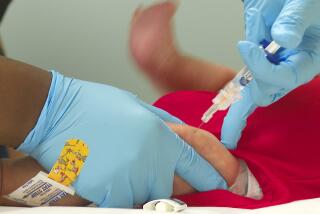Whooping Cough Isn’t Confined to Youngsters
- Share via
Whooping cough, usually considered a disease of the very young, is an extremely common--but rarely recognized--cause of nasty lingering coughs in teens and adults, researchers reported recently.
Preliminary new figures from the U.S. Centers for Disease Control and Prevention suggest that several hundred thousand adolescents and grown-ups may get sick enough annually with this infection to seek medical treatment.
Virtually all children in developed countries are vaccinated against whooping cough, which doctors call pertussis. But immunity appears to wear off gradually, beginning around age 8 or 10.
When whooping cough strikes teenagers and adults, it typically starts with coughing spasms and then settles in as a dry cough that can go on for six to eight weeks. But since there is no easy test for pertussis, the bout is often blamed on colds or flu.
In the very young, the infection leads to severe coughing, difficulty in breathing, vomiting and a rapid inhaling of air that causes the characteristic “whooping” sound.
Dr. Joel I. Ward, director of the UCLA Center for Vaccine Research in Torrance, said he believes safer pertussis vaccines that recently became available for infants also will prove useful as booster shots for teenagers and adults.
The latest findings on whooping cough were presented at an infectious disease conference sponsored by the American Society for Microbiology.
Ward estimates that pertussis is to blame for about one-quarter of all adult coughs that last longer than two weeks. However, accurate figures are elusive, in part because the bug is often gone by the time people seek medical care.
Adult whooping cough can be shortened with antibiotics if taken within a week or two of the start of symptoms. After that, the cough lingers even though the bacteria have been eliminated from the body, and there is no good treatment.
In an attempt to see just how common it is, Dr. Peter Strebel and others from the CDC studied 226 members of a Minnesota health plan who were treated for coughs. Based on which test was used, 4% to 15% of these people appeared to have had whooping cough.
Strebel said this could mean that from 200,000 to 900,000 Americans ages 10 to 49 have serious coughs caused by pertussis each year.
A study by the National Institutes of Health is enrolling from 2,000 to 3,000 volunteers to test the safety and effectiveness of pertussis booster shots in teenagers and adults. Doctors hope to have an answer within about two years.





